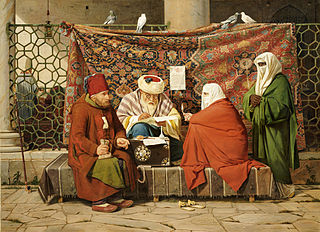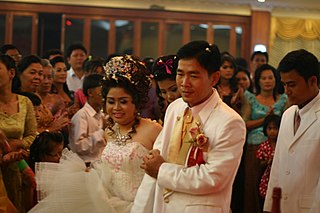Related Research Articles
Marriage, also called matrimony or wedlock, is a culturally and often legally recognised union between people called spouses. It establishes rights and obligations between them, as well as between them and their children, and between them and their in-laws. It is nearly a cultural universal, but the definition of marriage varies between cultures and religions, and over time. Typically, it is an institution in which interpersonal relationships, usually sexual, are acknowledged or sanctioned. In some cultures, marriage is recommended or considered to be compulsory before pursuing sexual activity. A marriage ceremony is called a wedding, while a private marriage is sometimes called an elopement.

Polygyny is a form of polygamy entailing the marriage of a man to several women. The term polygyny is from Neoclassical Greek πολυγυνία (polugunía); from Ancient Greek πολύ (polú) 'many', and γυνή (gunḗ) 'woman, wife'.
Polygamy is the practice of marrying multiple spouses. When a man is married to more than one wife at the same time, it is called polygyny. When a woman is married to more than one husband at the same time, it is called polyandry. In sociobiology and zoology, researchers use polygamy in a broad sense to mean any form of multiple mating.

In Islam, nikah is a contract exclusively between a man and woman. Both the groom and the bride are to consent to the marriage of their own free wills. A formal, binding contract – verbal or on paper – is considered integral to a religiously valid Islamic marriage, and outlines the rights and responsibilities of the groom and bride. Divorce in Islam can take a variety of forms, some executed by a husband personally and some executed by a religious court on behalf of a plaintiff wife who is successful in her legal divorce petition for valid cause. Islamic marital jurisprudence allows Muslim men to be married to multiple women.

Nikah halala, also known as tahleel marriage, is a practice in which a woman, after being divorced by triple talaq, marries another man, consummates the marriage, and gets divorced again in order to be able to remarry her former husband. Nikah means marriage and halala means to make something halal, or permissible. This form of marriage is haram (forbidden) according to the hadith of Islamic prophet Muhammad. Nikah halala is practiced by a small minority of Muslims, mainly in countries that recognise the triple talaq.
Conflict of marriage laws is the conflict of laws with respect to marriage in different jurisdictions. When marriage-related issues arise between couples with diverse backgrounds, questions as to which legal systems and norms should be applied to the relationship naturally follow with various potentially applicable systems frequently conflicting with one another.

A husband is a man involved in a marital relationship, commonly referred to as a spouse. The specific rights, responsibilities, and societal status attributed to a husband can vary significantly across different cultures and historical periods, reflecting a global perspective on this role.

Marriage law is the legal requirements, an aspect of family law, that determine the validity of a marriage, and which vary considerably among countries in terms of what can and cannot be legally recognized by the state.
The type, functions, and characteristics of marriage vary from culture to culture, and can change over time. In general there are two types: civil marriage and religious marriage, and typically marriages employ a combination of both. Marriages between people of differing religions are called interfaith marriages, while marital conversion, a more controversial concept than interfaith marriage, refers to the religious conversion of one partner to the other's religion for sake of satisfying a religious requirement.

Traditional Sunni and Shia Islamic marital jurisprudence allows Muslim men to be married to multiple women. Men can have up to four wives at a time according to the islamic jurisprudence.

Courtship, marriage, and divorce in Cambodia are important aspects of family life. Customs vary as between rural and urban areas, with many city dwellers being influenced by western ideas. The choice of a spouse is usually undertaken by the families of young men and women, sometimes with the help of a matchmaker. A man usually marries between the ages of nineteen and twenty-five and a woman between sixteen and twenty-two.

Polygamy, including polygyny, is outlawed in India. While it was not prohibited in Ancient India and was common among aristocrats and emperors, it is believed that it was not a major cultural practice. The lack of prohibition was in part due to the separation between land laws and religion, and partially since all of the major religions of India portrayed polygamy in a neutral light.
The Republic of Afghanistan, which is an Islamic Republic under Sharia Law, allows for polygyny. Afghan men may take up to four wives, as Islam allows for such. A man must treat all of his wives equally; however, it has been reported that these regulations are rarely followed. While the Qur'an states that a man is allowed a maximum of four wives, there is an unspecified number of women allowed to be his 'concubines'. These women are considered unprotected and need a man as a guardian.
The legal status of polygamy varies widely around the world. Polygyny is legal in 58 out of nearly 200 sovereign states, the vast majority of them being Muslim-majority countries. Some countries that permit polygamy have restrictions, such as requiring the first wife to give her consent.
Polygamy and civil polygamous marriages are legal in Bangladesh but restricted according to a law of 1961, though the practice is rapidly declining. According to a Pew Research Center study, less than 1% of Bangladeshi men are in polygamous marriage, much lower than the average rate found in other nations that permit polygamy. Certain cities have also placed hefty taxes on the practice of polygamy, with the tax increasing per each new wife the man takes. A Bangladeshi Muslim man can marry up to four wives at the same time but must have permission from existing wives. There is no known limit for the number of wives a Hindu man can take in Bangladesh.
Bharatiya Muslim Mahila Andolan or BMMA is an autonomous, secular, rights-based mass organization led by Zakia Soman which fights for the citizenship rights of the Muslim women in India. The BMMA was formed in January 2011. The organisation is based in Mumbai.
All the Muslims in India are governed by the Muslim Personal Law (Shariat) Application Act, 1937. This law deals with marriage, succession, inheritance and charities among Muslims. The Dissolution of Muslim Marriages Act, 1939 deals with the circumstances in which Muslim women can obtain divorce and rights of Muslim women who have been divorced by their husbands and to provide for related matters. These laws are not applicable in the states of Goa, where Goa civil code is applicable for all persons irrespective of religion and state of Uttarakhand. These laws are not applicable to Indians, including Muslims, who married under the Special Marriage Act, 1954.
Divorce in Pakistan is mainly regulated under the Dissolution of Muslim Marriage Act 1939 amended in 1961 and the Family Courts Act 1964. Similar to global trends divorce rate is increasing gradually in Pakistan too. In Punjab (Pakistan), in 2014 khula cases registered were 16,942 that rose to 18,901 cases in 2016.

In Pakistan, there are two laws governing Hindu marriages. One is the Sindh Hindu Marriage Act of 2016 which is applicable in the Sindh province of Pakistan and another is the Hindu Marriage Act of 2017 which is applicable in Islamabad Capital Territory, Balochistan, Khyber-Pakhtunkhwa and Punjab provinces. However, there are no laws and amendments made to register a marriage between two Hindus- one from Sindh and another from a different Province. Most of its articles are borrowed from Hindu Marriage Act, 1955 of British India, which was passed by British Raj.
The legislative assembly of Pakistan has enacted several measures designed to give women more power in the areas of family, inheritance, revenue, civil, and criminal laws. These measures are an attempt to safeguard women's rights to freedom of speech and expression without gender discrimination. These measures are enacted keeping in mind the principles described by the Quran.
References
- ↑ "Muslim Family Laws Ordinance, 1961" (PDF). Refworld, The UN Refugee Agency.
- ↑ "Christian women at the mercy of Christian Divorce Laws 1869 in Pakistan" . Retrieved 23 April 2020.
- ↑ "Pakistan passes law recognising Hindu minority marriage" . Retrieved 23 April 2020.
- ↑ Canada: Immigration and Refugee Board of Canada, Pakistan: Practice of polygamy, including legislation; rights of the first wife versus the second, including whether she has the right to refuse a second wife (2011-2013), 18 December 2013, PAK104701.E , available at: https://www.refworld.org/docid/52eb9ea04.html [accessed 22 September 2019]
- ↑ Zakaria, Rafia. "The problems of polygamy".
- 1 2 "Pakistan makes landmark ruling against man for second marriage". The Tribune.